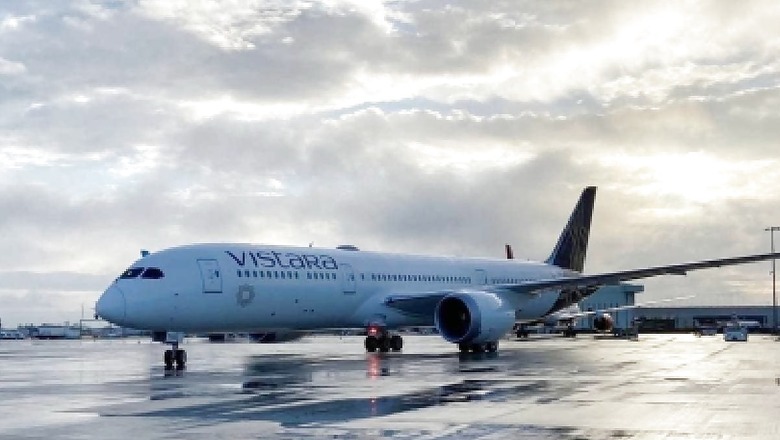
views
Vistara became the first Indian airline to use sustainable aviation fuel (SAF) to fly a wide-body aircraft on a long-haul flight on Thursday, March 30. A joint venture of Singapore Airlines and Tata Group, Vistara announced that the special flight was operated from Charleston International Airport, South Carolina to Indira Gandhi International Airport, Delhi. The plane was a brand-new Boeing 787-9 Dreamliner. The project was completed in partnership with GE Aerospace and Boeing.
What is sustainable aviation fuel?
SAF is a cleaner alternative to conventional jet fuel. It can lower carbon emissions over the fuel’s lifecycle by up to 80 percent, depending on the feedstock. Vistara used a blend of 30 percent sustainable aviation fuel with 70 percent conventional jet fuel in its maiden SAF flight. The operator was able to reduce almost 1.5 lakh pounds of carbon emissions over the fuel’s life cycle. The main issue in using sustainable aviation fuel is the regular availability of the product.
Also Read: Vistara Airline to Start Direct Flight From Mumbai to London from June 1
Mr. Vinod Kannan, Vistara’s Chief Executive Officer, stated that this was an important milestone in the operator’s commitment towards becoming carbon neutral. “We thank our partners, Boeing and GE Aerospace, for their support and hope that initiatives such as this, open up more avenues for the industry to increasingly adopt sustainable technologies. Since the very beginning, Vistara had decided to invest in modern and advanced new aircraft with fuel efficient engines, and we remain committed towards reducing carbon emissions across all areas of our operations,” he added.
As reported by the Times of India, carriers like SpiceJet and IndiGo have previously operated flights with sustainable aviation fuel. SpiceJet’s turboprop Bombardier Q400 and IndiGo’s Airbus A320 family aircraft have flown with blends of regular jet fuel and SAF. Vistara became the first Indian carrier to operate a long-haul flight using the blend.
India, along with other nations, is trying to use SAF in flights to reduce carbon emissions. To help the country meet its targets, Vistara and other Tata Airline companies have signed a Memorandum of Understanding with the Council of Scientific and Industrial Research – Indian Institute of Petroleum regarding the research, development and deployment of SAFs. The airline would also work to lower CO2 emissions for international flights and to curb the industry’s impact on climate change through the Carbon Offsetting and Reduction Scheme for International Aviation (CORSIA).
Read all the Latest Auto News here




















Comments
0 comment